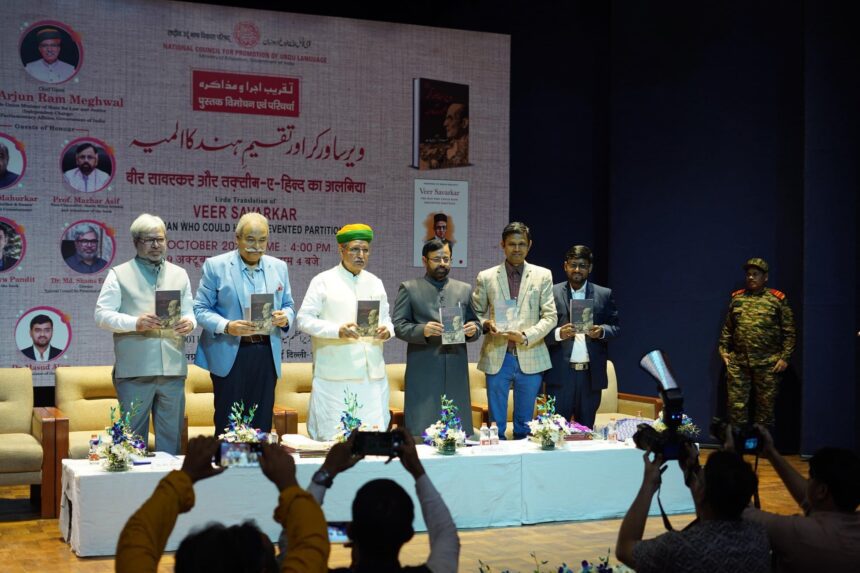Following the release of an Urdu translation of a book extolling Hindutva leader Vinayak Damodar Savarkar by the National Council for the Promotion of Urdu Language (NCPUL), the Narendra Modi administration has faced criticism for allegedly using governmental institutions to promote Hindutva figures.
The book, titled “Veer Savarkar aur Takseem Hind ka Alamiya,” is an Urdu adaptation of “Veer Savarkar: The Man Who Could Have Prevented Partition,” authored by Uday Mahurkar and Chirayu Pandit in 2021. The Urdu edition was launched at an event at the Prime Minister’s Museum in New Delhi on Thursday.
At the launch, Law Minister Arjun Ram Meghwal praised Savarkar as a visionary, claiming he was “deeply sensitive to national unity and integrity.” Meghwal stated, “Had Savarkar’s vision and planning been implemented, the country could have been saved from disintegration.”
Uday Mahurkar, one of the authors, remarked that the publication offers a “true and fair” portrayal of Savarkar, countering numerous distortions spread by political ideologies with historical evidence.
Professor Mazhar Asif, Vice Chancellor of Jamia Millia Islamia and one of the translators, described the book as an in-depth examination of Savarkar’s views on national development and unity. Asif has faced scrutiny for engaging with events organized by BJP and RSS-affiliated groups, raising concerns about the academic independence of Jamia Millia Islamia.
He emphasized that the book critically scrutinizes prevalent misconceptions about Savarkar through empirical evidence, highlighting knowledge that he believes every Indian should have.
The authors assert that their work aims to provide “truthful and unbiased information” and to dispel misconceptions linked to specific political ideologies.
However, some historians and former NCPUL officials have expressed concerns that the narrative being constructed around Savarkar contradicts established historical evidence. Professor Nadeem Rezavi, secretary of the Indian History Congress and faculty member at Aligarh Muslim University, described the situation as “shocking.”
Rezavi noted that Savarkar endorsed the two-nation theory long before the Muslim League formally adopted it in 1940. He cited a 1937 address where Savarkar declared the existence of two nations in India—Hindus and Muslims—arguing that such rhetoric legitimized communal divisions contributing to the climate that led to Partition.
Under Savarkar’s leadership, the Hindu Mahasabha formed coalitions with the Muslim League in Sindh and Bengal during the Quit India Movement. Rezavi also mentioned Savarkar’s support for Travancore’s bid for independence in 1947 as a means to counteract a secular Indian state.
“Had it not been for Savarkar’s toxic ideas, perhaps Partition could have been avoided,” Rezavi concluded, stating, “He did not believe in coexistence, only in Hindu dominance.”
A former NCPUL official criticized the council’s actions as a deviation from its founding mission, asserting that the NCPUL was created to promote the Urdu language and literature, not to publish works on politically divisive figures.
Tags: Savarkar, Urdu translation, historians critique, Hindu dominance, NCPUL
Hashtags: #Historians #slam #Urdu #translation #glorifying #Savarkar #backed #NCPUL #believed #Hindu #dominance










